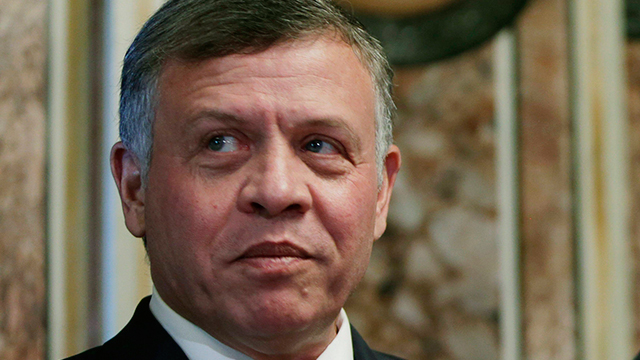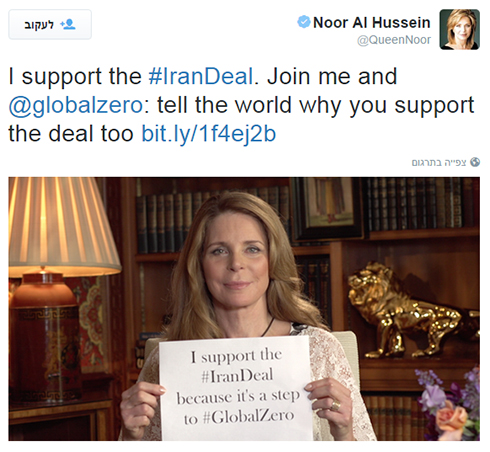For instance, the 64 year-old queen has joined a group of Hollywood celebrities by expressing her support for the Iran nuclear deal. She even posted a photo to Twitter, in which she holds a sign calling for support of the deal.
A number of pundits in Jordan say that the queen has broken traditional royal protocols, since it’s unusual that a member of the royal family expresses their opinions on sensitive state matters. This is in addition to the fact that Jordan’s government has hesitated to express an official opinion on the Iran deal, saying that it needed to examine it thoroughly.
The tweet that angered a nation
The Iran deal tweet was not Noor’s first controversial one. In a tweet that showed a picture of a donkey, apparently taken in Jordan’s capital city of Amman, the queen wrote, “These 4 legged Amman residents foraging 4 food remind me of how common a sight this was 40 yrs ago when I 1st arrived.” Many demanded explanations regarding her meaning, since implications that insult the royal family and harm the country’s image could be inferred from her words. Noor’s Twitter account is followed by over 500,000 people worldwide.
Jordanian media member Deema Alam Farraj, considered close to Queen Rania (wife of current Jordanian monarch Abdullah II), has criticized Queen Noor heavily for not clarifying her statement despite the controversy. However, there were also those in the kingdom who saw Farraj’s words as a deliberate smear campaign directed at Noor.
Interpretations of the queen’s tweet ranged from those who thought it was a mere expression of nostalgia, to those who say she was trying to criticize the state of affairs in Jordan, which hasn’t changed since she arrived. The queen was born in the United States to a father of Syrian descent, and a mother of Swedish descent. Her birth name was Lisa Najeeb Halaby.
“If she saw a donkey and was filled with nostalgia it’s a disaster and a big insult,” said Farraj. Another Jordanian journalist said that “the King (Abdullah II) is looking for investments and wants to show the world how developed Jordan is, and the queen of Jordan advertises a donkey on the streets. It’s a clear contradiction, friends.”
However, there were also those who came out in defense of the queen, with one supporter speculating that she was trying to display the simplicity that still exists in Amman after all these years.

The straw that broke the Jordanians' backs came at the end of August. Queen Noor tweeted a link to an English-language report which criticized the state of various freedoms in Jordan, and accused King Abdullah of contradicting himself on the subject. Her actions angered Jordanians, some of whom wondered why the queen didn’t also publish a recent international human rights report that states Jordan is the top Arab country in the world as far as human rights preservation is concerned.
A few days after that latest controversial tweet, the royal family released a fairly unusual statement, saying that any opinions expressed by anyone other than the king or the heir to the throne reflect only their own personal views, just like with any other citizen. The statement didn’t mention Queen Noor by name.
Disagreements and clashes in the Jordanian royal family aren’t uncommon. The relationship between Prince Hassan (brother of late King Hussein) and King Abdullah has known its ups and downs. Jordanians have also not forgotten how King Abdullah rescinded the title of heir apparent from his half-brother, Prince Hamzah (the son of King Hussein and Queen Noor), in 2004.


















